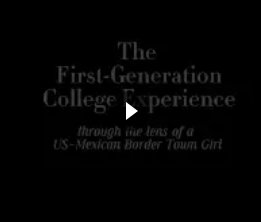The First-Generation Experience
Posted on Apr 4, 2024This video represents the experience of a bilingual first generation college student who fled her hometown in order to seek higher-education in a larger and more diverse city. The creator grew up in a US-Mexican border city that is heavily populated by a majority of Hispanic/Latinx people.
The culture that she grew up in heavily relies on community and remaining true to traditional values, such as the prioritization of family.
“Vendrán aquí, y despues se iran” (Pic- Nic, 1968). These lyrics at the start of the video translate to: “they will come here and then they will leave.” This conveys a common experience of individuals who leave their family and/or hometowns in pursuit of higher education and their dreams. This depicts the creator’s unique experience growing up in a US-Mexico border city and later being the first person from her family to leave her hometown for higher education. The creator’s experiences living in poverty throughout her childhood, leaving her hometown, and supporting herself through her undergraduate education has resulted in battling feelings of guilt and shame over her family members not having the same opportunities. These emotions are further challenged due to having to work to survive and rarely having the time or financial resources to visit her hometown.
“Quisiera ser la golondrina, y tener alas para poder volar.” (Pic- Nic, 1968)
These lyrics illustrate the creator’s desire to be able to fly like a bird.
She wishes it was just as easy to revisit her hometown and family– knowing that this isn’t possible due to the lack of resources such as money for a car or greyhound ticket during her undergraduate college years. Just as the two boats meet along their journey on the river, she wishes she could relive and recreate the happy, joyous, and short-lived memories from when she was able to visit home. Despite the constant isolation and distance she feels, the creator understands that just like the single, lone boat rider on their own journey, she must also continue her own journey. In doing so, the creator hopes to pursue her dreams of being able to sustain herself and ultimately help her mother break out of cyclical poverty.
The mood of the video accompanied with the song conveys a nostalgic feeling, one that is far-fetched, yet hopeful. The dichotomy between the experiences of living in a city 4 hours away from a border-city is displayed through the initial imagery of skyscrapers and city buildings accompanied with the view of a river.
The creator yearns for connection with other people who have had similar experiences of being a first-generation college student. She is working to increase the visibility and awareness of the experiences of first-generation college students, particularly those with intersecting identities that have been historically oppressed, such as LGBTQ+ BIPOC, international students, those with complex immigration statuses, and disabled folks.
Works Cited: Pic-Nic/Jeanette. (1968). Negra Estrella [Song]. On Pic-Nic EP. Hispavox.

